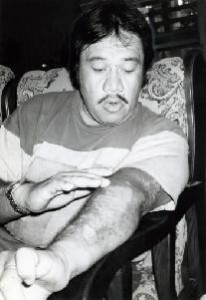4. French Deception
Feb. 15, 2013
Chapter 3: The Central, South Pacific and Australia
Part 3: The French Cover-up in Polynesia
Part 3: The French Cover-up in Polynesia
France has shown that it is willing to employ any means necessary to ensure the continuation of its nuclear testing in Polynesia, despite the opposition of the whole of the South Pacific. The French government has knowingly withheld information regarding the tests, deceived the local people, and even resorted to force against one of its allies in the region.
When Philip, a former worker at Moruroa, went to see a French doctor about a problem that was bothering him, he was told that his illness had nothing to do with radiation. But the same doctor's parting words were, "Now don't tell anybody about it, will you?"
Philip's strong brown arms were covered in patches of mottled pink. The same marks could be seen all over his stomach and back.
"This is what happened when I went swimming at Moruroa," he told us. "This horrible rash broke out all over my body." He looked down at his arms. Six years ago when Philip was working as a laborer in Papeete, his father told him that the money was better at the test site, so he got a job on Moruroa. His work there consisted of carrying water to the explosion site to clean contaminated equipment. Heeding the warnings he and his fellow workers were given by the French, he made sure not to eat any fish caught near the site.
As he got used to working on the site, however, he let down his guard a little. One afternoon when it was particularly hot, he decided it wouldn't do any harm to go for a quick dip in the sea, although it was forbidden to do so.
In no time at all he realized the folly of his actions. That same evening, a red rash broke out all over his body, and he was almost driven mad by the itching.
Admittedly, it is not absolutely certain that Philip's skin condition was brought on by sea water contaminated by nuclear testing, as it is extremely difficult to prove any definite relationship between radiation and disease. However, whenever any Polynesian, concerned about the effects of radiation, consults a French doctor, he or she is invariably told that there is nothing to worry about.
The most frustrating thing for the islanders is the lack of advanced medical care in Polynesia. On the one hand the French authorities say that nuclear testing poses no threat to the health, yet the French send all cancer and leukemia patients to Paris for treatment, and do not reveal any details about their illnesses.
Starting in 1966 when the first test was carried out, France has engaged in a blatant cover-up of health statistics in Polynesia. Since that year no data has been revealed on the number or causes of deaths in the colony. Nor has any information been released regarding nuclear fallout from the tests. The reports filed at the request of the United Nations are said to be next to useless, being obvious substitutes for the real thing. There has been no improvement in this state of affairs, despite severe criticism from the International Labor Organization and the World Health Organization.
"If only we had doctors we could trust." Philip's plea was echoed by all the islanders we spoke to. Excluding dentists, the overwhelming majority of medical practitioners in French Polynesia are French. For one of the local people to become a doctor, they would first of all have to master the French language, then go to France to study. The cost of this is far beyond the means of a Polynesian family.
By silencing the residents, neglecting to reveal vital data, and creating a French monopoly on doctors, the French would appear to have found a watertight system for covering their tracks in Polynesia.








